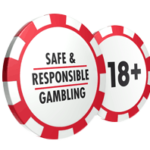Responsible Gambling 🦺
Have you thought about the concept of responsible gambling? It is extremely important for online gambling aficionados all around the world, so keep reading to ensure a safe and fun experience!
 Every day, millions of people around the world enjoy gambling as a fascinating kind of entertainment. Responsible gambling, whether in casino games, betting, or other pastimes with the potential to win money, may be enormously pleasurable and, at times, financially profitable.
Every day, millions of people around the world enjoy gambling as a fascinating kind of entertainment. Responsible gambling, whether in casino games, betting, or other pastimes with the potential to win money, may be enormously pleasurable and, at times, financially profitable.
Nonetheless, gambling has intrinsic hazards in addition to the obvious risk of monetary loss while playing. On the following page, we will go into these concerns and walk you through spotting indications of losing control in yourself or someone close to you.
Furthermore, we will share thorough insights on how to address these dangers in advance and offer recommendations on regaining control when necessary. Responsible gambling is essential!
While our website is dedicated to improving your casino abilities and refining your sports betting methods, we also have the obligation of safeguarding our users’ safety. The most efficient method to fulfill this responsibility is to educate people about responsible gambling.

The Risks of Gambling ⚠️
As previously stated, there are certain hazards that must be considered when indulging in casino activities or sports betting, whether online or in person. The main danger is the possibility of acquiring a gambling addiction.
Gambling addiction is a common problem that can impact people in the same way as alcohol or drug addiction might. Contrary to popular belief, it is not limited to people who cannot afford to bet. The truth is that anyone, regardless of financial situation, can become addicted to gambling.
To dispel the idea that only certain people are vulnerable, let us begin at the beginning. To avoid this problem, it is critical to take responsible gaming seriously.
Understanding Gambling Addiction 🔎
Gambling addiction is regarded as a mental health disease, not only a financial issue. It is classified as a mental health disorder, similar to addictions to chemical substances, sex, and other behaviors. This syndrome occurs when people find it difficult to stop gambling, even when they are aware that it is badly affecting their lives and the lives of those around them. Gambling addiction is defined by the inability to control the need to gamble, regardless of the consequences.
After just one gambling session, a person does not become a pathological gambler or gambling addict. There are various phases in the road of addiction. The line between problematic conduct and pathological gambling gets progressively blurred in the quest of fun and entertainment in games of chance.
The Pathway to Gambling Addiction
Gambling is first regarded as joyful, with any profits adding to the allure and generating emotional highs. Individuals who credit their success to talent rather than luck are more likely to place larger wagers and gamble for longer periods of time. The stakes increase, as do the frequency and duration of gaming sessions.
As an individual’s concentration shifts more toward gambling, it becomes a way to recreate a sensation of exhilaration. The action is hidden from loved ones, friends, and coworkers, resulting in increased dishonesty. Gamblers may borrow money from numerous sources to cover gambling obligations or to perpetuate the habit.
Eventually, the situation deteriorates to the point where the individual finds it impossible to stop gambling, despite the negative influence on their relationships, employment, and financial well-being. At this point, gambling becomes an addiction. It, like other addictions, causes emotions of shame, guilt, and, in severe cases, suicidal ideation.
Who is at risk of developing a gambling addiction?
When people are not informed of safe gaming, they can become pathological gamblers. Some individuals fall into the greater risk category.
- It has been demonstrated that having access to gambling increases the danger.
- People who are unemployed or have a low income are vulnerable.
- People who seek thrills and are less impulsive are at risk.
- People under the age of 30, particularly men, are at risk.
- This category also includes older adults who enjoy games like bingo and slot machines.
Compulsive gamblers are more likely to struggle with substance misuse, personality disorders, depression, or anxiety. Gambling addiction has been linked to bipolar illness, obsessive-compulsive disorder (OCD), and attention-deficit/hyperactivity disorder (ADHD).
Reasons Why People Become Addicted to Gambling 📖
A variety of variables contribute to someone developing a gambling addiction. For some, it is purely psychological or social in nature, impacted by their personal relationship with gambling.
 Gambling in a responsible manner. On the other hand, some people are genetically predisposed to gambling addiction. According to research, children of addicts have a genetic susceptibility to develop their own addictive tendencies.
Gambling in a responsible manner. On the other hand, some people are genetically predisposed to gambling addiction. According to research, children of addicts have a genetic susceptibility to develop their own addictive tendencies.
Furthermore, people who are currently struggling with addiction, such as alcoholism, are at a higher risk of developing new addictions, such as gambling.
Gambling addiction is typically divided into two sorts, each with its own peculiarities, but both equally damaging and potentially harmful. Fortunately, ethical gambling can assist to reduce these hazards.
Compulsive Adiction
A person suffering from compulsive gambling has no control over their impulse or desire to play at all. They continue to play even when they know they can’t afford it, and they actively harm themselves, their career and personal lives, and the people around them in order to do so.
Because this form of addiction is a constant part of the gambler’s life, it is more visible and frequently easier to detect than the following category.
Binge Gambling
A binge gambler is someone who can’t control their want to gamble at some times but not all of the time. As a result, they can frequently fool themselves and others into believing they have control because they are not always playing. When the desire strikes, however, the binge gambler, like the obsessive gambler, has no control.
In some ways, this sort of addiction is worse because it can last longer before it becomes clear that there is a problem.
Complications Associated with Gambling Addiction ☠️
As previously said, compulsive gambling can have substantial and long-term consequences in your life, which may include:
- Relationship Issues: Problems with your significant other, family members, friends, and coworkers.
- Financial difficulties include situations such as bankruptcy, when compulsive gamblers may turn to desperate tactics such as borrowing money, taking out loans, engaging in fraud, or stealing money.
- Legal Consequences: There is a possibility of legal troubles or jail, which frequently stems from an inability to settle debts or being discovered stealing.
- Occupational decline: Poor work performance or possibly job termination.
- Deteriorating Health: As a result of increasing stress and sadness, general health may worsen.
- Concerns about Mental Health: Suicide, suicide attempts, or suicidal thoughts may become a problem.
Signs That You’re Losing Control ⚡
Obsessive Thoughts about Gambling
A clear sign of developing a gambling addiction is the constant preoccupation with obtaining more money to engage in further gambling activities. This preoccupation becomes a persistent aspect of a person’s life, even during periods when they are not actively gambling.
For instance, individuals with a gambling addiction may spend entire days reflecting on past gambling experiences or planning their next gambling session.
Escalating Risk-Taking
Addicts often find themselves compelled to take progressively higher risks to satisfy their cravings. Similar to a drug addict increasing their dosage to achieve the same euphoria, a gambler may need to raise the stakes to maintain the same level of excitement.
It’s crucial never to gamble with money that cannot be comfortably lost, and gambling should never take precedence over financial responsibilities.
Hostility Towards Acknowledging the Issue
Individuals facing gambling problems may react with anger and frustration when others comment on their behavior or suggest that they should stop or cut back. Additionally, they may experience stress and anxiety when unable to engage in gambling activities for various reasons.
The inability to gamble should not be a source of distress.
Chasing Losses to Recover
A fundamental rule in gambling is to avoid chasing losses, as it often leads to more significant financial setbacks and the formation of detrimental habits. Every gambler must acknowledge that losses are inevitable at times, and when they occur, it is essential to cease and start anew.
Attempting to recover losses through gambling is technically unfeasible and poses significant risks.
Gambling as a Coping Mechanism or Reward
Whether in casinos or sports betting, all forms of gambling should be viewed as paid entertainment for leisure time. It should never be relied upon as a means to cope with distress, depression, or other negative emotions.
Similarly, gambling should not serve as a reward for completing less enjoyable tasks.
Deceptive Practices to Conceal
It’s important to recognize that many addicts are fully aware of their issues, even if they refuse to acknowledge them to others or themselves. Consequently, their struggles are often associated with feelings of shame.
As a result, individuals may resort to dishonesty about the extent of their gambling activities and losses.
Now, these six points are considered the foundation of gambling addiction and the signs are used to diagnose addiction. That being said, the list isn’t complete and there are many other signs of when a recreational interest in gambling becomes an issue.
How To Stop Gambling and Regain Control 🛑
If you find yourself gambling irresponsibly and suspect that it has become an issue or you’re developing unhealthy habits, seeking help is crucial. Just like many drug addicts require assistance to stop taking drugs, most individuals struggling with gambling can’t overcome it on their own.
Halting problem gambling is a formidable challenge, and maintaining abstinence presents an ongoing struggle. Former problem gamblers often find it difficult to engage in casual gaming again due to the lingering desire to place bets.
For individuals looking to lead a fulfilling and healthy life, a treatment strategy emphasizing abstinence is typically necessary. Establishing an effective recovery program is essential to prevent relapse and maintain abstinence.
Stopping Gambling Independently
While there are exceptions, if you can stop on your own, that’s commendable. Here are eight strategies to aid you in this journey:
- Prepare for Boredom: Since gambling may have filled your spare time, plan alternative activities. Initially, this might seem dull as you won’t experience the usual adrenaline rushes.
- Take it One Day at a Time: Focus on the present day, leaving yesterday behind and not worrying about tomorrow until it arrives.
- Explore New Activities: Stimulate your mind by trying something new. It doesn’t have to be a major undertaking; even small activities like learning to bake or cultivating a plant can engage your problem-solving skills.
- Rediscover Old Interests: Pick up unfinished books or incomplete craft projects to reconnect with past enjoyments.
- Identify Triggers: Be aware of situations triggering your gambling urges. If certain events or sports seasons were associated with betting, minimize exposure to related media.
- Manage Stress Positively: Find constructive ways to cope with stress, such as gardening, exercising, meditating, or talking to someone non-judgmental.
- Realize the Odds: Remind yourself that gamblers rarely win big. Dispel the notion that one more bet will solve all problems, recognizing it only perpetuates the cycle.
- Maintain a Gratitude Journal: Although it may sound cliché, keeping a journal of positive changes in your life can be self-healing. Reflecting on things you’re grateful for reinforces them and fosters appreciation.
Remember, seeking professional help is always an option if you find these strategies insufficient.
Online Casino Limits and Restrictions
Setting self-imposed restrictions is a common practice for individuals aiming to maintain a responsible approach to online gambling. Many international gambling sites now offer features allowing users to establish gambling limits and even block access to their platforms as part of responsible gambling initiatives.
 Players have the flexibility to choose one or more limitations or temporarily suspend their active casino accounts, tailoring the restrictions to meet their specific requirements.
Players have the flexibility to choose one or more limitations or temporarily suspend their active casino accounts, tailoring the restrictions to meet their specific requirements.
Typically, casinos provide a range of self-imposed limits, including:
- Deposit Limit
- Spending Limit
- Betting Limit
- Daily Time-based Limit
- Temporary Suspension
While self-imposed limits work well for some, those with more severe gambling issues may find it beneficial to request a permanent restriction. This involves the casino prohibiting future play. To lift this self-imposed ban, individuals need to contact the casino and make a formal request.
Reputable casinos employ staff trained in responsible gambling who take requests for resuming play seriously. Some go the extra mile by proactively contacting users who exhibit signs of compulsive gambling, advising them to seek assistance.
Recognizing the need for support is crucial when addressing gambling addiction. Seeking help is a significant step, and several effective methods are available:
- Therapy:
Contact your regular doctor for assistance or direction. Seeking help through a doctor makes the issue official and involves impartial individuals, making it harder to ignore the problem.
- Counselling for Quitting Gambling:
Talking therapy and counseling can address emotional scars hindering progress. Establishing trust with a therapist helps identify personal relapse risks and triggers, leading to the creation of a recovery maintenance strategy.
- Support Groups:
Support groups provide an avenue to connect with individuals facing similar challenges, fostering a sense of community and shared experiences.
- Gamblers Anonymous (GA):
GA operates worldwide, following the principles of Alcoholics Anonymous (AA). Meetings are available globally, providing a supportive environment for those seeking help.
- Medical Treatment:
In some cases, Gamblers Anonymous or therapy may not suffice. Medical treatments, such as antidepressants and rehab, can be essential, especially if gambling is part of a broader mental health issue. Seeking medical treatment ensures appropriate assistance for mental health conditions.
While rehabilitation is accessible globally, it is advisable to involve your regular doctor when considering such options. This approach ensures a comprehensive and well-guided process.
What to do when a loved one Gambles too much 👋
If you suspect that a family member, friend, or colleague is struggling with a gambling problem or not gambling responsibly, it’s crucial to take action. You can do this by expressing your concerns to the person or encouraging them to seek assistance.
As mentioned, many individuals with gambling issues are aware of their problem, and a significant number, although not all, are relieved to receive help and acknowledgment.
Before you approach and address someone with a potential gambling problem, it’s advisable to educate yourself on the subject, gaining a better understanding of responsible gambling. Always be supportive and non-judgmental, as a judgmental approach can worsen the situation and limit your ability to influence positively.
If you feel the problem is overwhelming or you’re unsure how to proceed, seeking help from organizations like GA (Gamblers Anonymous) or consulting a doctor is an option.
Talking to someone with a gambling problem is challenging, and the conversation may have an impact on you. Remember that your intention is to help them, and what you say alone won’t make them stop. It’s a process they must go through with your support and understanding.
Like many addicts, there’s a possibility that they may deny the problem or shift blame onto you. Avoid using harsh words, as they can harm your relationship. Here are some suggestions to aid both you and the individual dealing with the gambling issue:
- Communicate how their gambling affects you and express your feelings honestly and thoughtfully.
- Refrain from trying to control the gambler’s life, as it is unlikely to work and will make you miserable.
- Let the gambler know that you want to help and that you’ll be there for them. Acknowledge that they may be experiencing a loss of control, embarrassment, or humiliation.
- Treat them equally in all aspects; avoid shielding them.
- Don’t take on their burdens; instead, assist them in their struggle. Offering to be there with them while they address their issues is an option.
- Encourage them to take responsibility for their actions, including handling their job and financial matters. Avoid aiding them in lies and deceit.
Guidelines for Safe Gambling and Problem Prevention 🌟
Numerous “unwritten” rules govern the proper way to engage in online casinos and wager on sports internationally, ensuring a healthy approach and safeguarding against detrimental habits. Consider these responsible gambling tips to steer clear of potential pitfalls and ensure a positive gaming experience.
| Education | Enhancing your knowledge about the games you play and understanding the associated risks significantly reduces the likelihood of encountering issues. Ensure you are well-informed and possess a thorough understanding. |
| Entertainment | Always remember that gambling should be viewed as paid entertainment. The moment it transforms into a routine or a potential income source, you've entered a risky territory. |
| Limits | Implementing self-imposed limits is a highly effective way to manage your gambling activities. Establish a budget and consistently adhere to it. Additionally, set time constraints on how much and how often you engage in play. Many gambling sites and online casinos offer features for personal limit-setting within your account. |
| Funding | Never play with funds you cannot afford to lose, and avoid chasing losses. Adhering to these straightforward rules proves highly effective, provided you take them seriously. |
| Superstition | Ultimately, all forms of gambling rely on chance and luck, and there's no way to alter that reality. Even if you believe in a lucky number or a particular online casino, it's crucial to remember that this is not the case. |
| Influence & Mood | As gambling is a form of entertainment associated with risk, it's advisable not to play when under the influence or in a negative emotional state. Playing to alleviate anxiety or depression can lead to unfavorable outcomes and should be avoided. |
